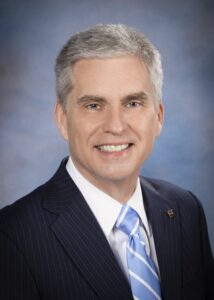The Blue & You Foundation for a Healthier Arkansas committed $5.29 million in support of six Arkansas-based partners and leaders to expand behavioral health resources across our state July 2021.
This is the largest one-time investment ever made through the Blue & You Foundation, and it all goes toward innovative behavioral health programs led by established and proven Arkansas-based organizations.
Following the announcement, several people asked me why – in a state with so many critical health needs – the Foundation selected behavioral health as such a high priority. I want to share what motivated us to focus on behavioral health. It is not an exaggeration to say that Arkansas and the rest of the U.S. have been experiencing a behavioral health crisis for quite some time.
Behavioral health is the broader term used to describe mental health conditions such as depression, anxiety and trauma, and substance use disorders characterized by overuse of drugs or alcohol.
The National Alliance for Mental Illness (NAMI) reports that more than 25 percent of all U.S. adults experience some type of behavioral health disorder. For the Millennial generation, which includes adults between the ages of 25 and 40, the rate is even higher, nearly one-third. Yet, 60 percent of those in need do not receive care for their condition each year.

Behavioral health is a significant health equity issue. While most minority groups, especially African Americans and Hispanic Americans, report lower rates of behavioral health conditions than White Americans, this is not a result of any individual or group behavior.
Instead, it is primarily due to the under-diagnosis of behavioral health conditions for these groups driven principally by access and stigma.
The behavioral health crisis has been made worse by the COVID-19 pandemic. Research published by the Kaiser Family Foundation on the implications of COVID-19 for mental health and substance abuse showed dramatic increases in rates of anxiety and depression for adults during the pandemic. It also predicted that “today’s elevated mental health need will continue well beyond the coronavirus outbreak.”
In Arkansas, we see rates of depression and anxiety among adults that exceed the national averages.
Behavioral health plays a major role in an individual’s ability to maintain good physical health, especially for those with chronic health conditions like diabetes, asthma, heart disease and lung disease. A report from the Robert Wood Johnson Foundation noted that an estimated 84 percent of total healthcare costs in the United States can be attributed to the treatment of chronic disease.
We know that Arkansas has some of the highest rates of chronic disease in the nation. Individuals with chronic disease are twice as likely to also have a behavioral health disorder. If someone is depressed, anxious or dealing with addiction, it is hard for them to effectively care for their chronic health condition. Physical health and behavioral health are intimately connected. You will not be successful in addressing one unless you address the other. Impacting these statistics and improving the quality of life for Arkansans are part of what motivated us to make such a significant investment in behavioral health.
But there is also a very human side to this crisis that deserves attention and must be addressed.
For those in need of behavioral healthcare, the challenges can be overwhelming. The behavioral healthcare system has struggled to keep up with demand.
Too often, patients and their families face a system that is hard to understand, navigate and access. A system marked by stigma, fragmented care, high costs and a shortage of clinicians. While we have behavioral health providers doing amazing work in our state, we still have too many undiagnosed and untreated people falling through the cracks. Simply put, individuals and families are suffering, and it is affecting all aspects of their lives.
Most of us have been touched by a behavioral health condition, either personally or through a family member or close friend. We have witnessed the struggles and felt the despair of trying to get help.
We believe every life deserves hope! That’s the human side of the behavioral health crisis and the part that motivated us the most.
Behavioral health must be supported in all stages of life – from early childhood, through adolescence, and into adulthood.
To achieve this, we have focused our investments on programs that are designed to do three things:
• Build life-long health, resiliency and well-being for children and families by activating early intervention practices and addressing the drivers of behavioral health conditions.
• Expand the behavioral healthcare workforce and better integrate behavioral health into primary care, which will improve access.
• Remove barriers to care, like the long-standing stigma around receiving behavioral health treatment.
If we are going to help people live better and healthier lives and impact the rate at which overall healthcare costs are growing, we must make progress on the behavioral health front.
We believe these investments and the organizations we have partnered with are going to make a difference. We hope other organizations will join us in making behavioral health a priority
Curtis Barnett is Arkansas Blue Cross and Blue Shield’s CEO and president.

